Edgar Tarimo is changing the world one brick at a time.
The teenage schoolboy from Tanzania just won a top international environment prize with his inspired project making house bricks out of plastic waste.
The 17-year-old now hopes that one day thousands of homes all over the developing world will be built out of the recycled plastic bottles, bags and packaging – and he wants to thank Australia for making it all possible.
For without Australian teacher Gemma Sisia who set up a school in poverty-stricken northern Tanzania and awarded him a free scholarship, and the thousands of Australians who support her every week with donations, he would never have been able to follow his dream of improving housing in his country.
“Being at her school has taught me how to think outside of the box and to see possibilities and opportunities out there in the world,” says Edgar, smiling.
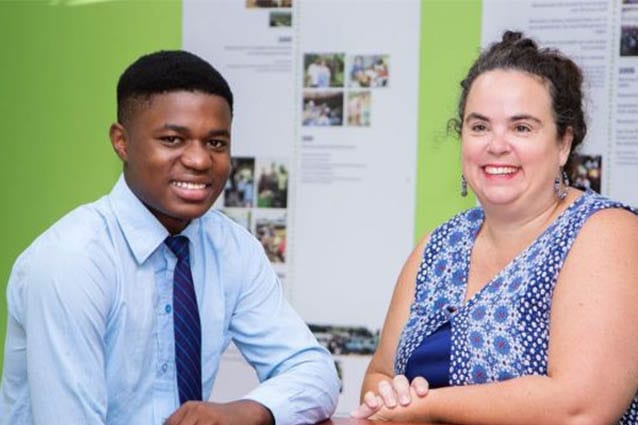
Schoolboy Edgar Tarimo with his Australian teacher Gemma Sisia, who started a school in Tanzania 16 years ago with just three students.
“Gemma is the person who’s changed my life. I’m a new person because of the education she’s given me. If she hadn’t come and built her school, with other Australians sending over funds to help, I have no idea what I’d be doing now – if anything at all.”
Edgar is just back home from a trip to Sweden to accept the 2017 Children’s Climate Prize for his scheme recycling plastics to build permanent homes. The idea came to him after seeing mud-brick houses in the nation’s capital Dar es Salaam swept away in floods, and knowing how plastic litter is destroying the countryside.
He’s a pupil at the School of St Jude in Tanzania’s second city Arusha started by education pioneer Gemma Sisia. From a sheep property in Armidale, she went to Africa for a holiday, fell in love with her Tanzanian safari guide and then built the school 16 years ago on some land donated by her new father-in-law.
She began with just herself and three pupils. Today, she has 2000 students and 350 staff, and her school is recognised as one of the best in East Africa.
“It’s so wonderful to see kids like Edgar flourishing and it gives energy and inspiration to all the other children to see him do so well,” says Gemma, now with four children of her own, aged between16 and five. “He’s a very humble boy, but he’s passionate and quietly driven to change the world.
“When you have kids who grow up with very little, that struggle can end up becoming a real gift. Of course, it’s not nice to see them struggle, but it helps them appreciate what they’ve got and teaches them to be strong and determined.
“They come from poverty-stricken families and, as a result, they aren’t pushovers. So if someone tells them something isn’t possible, they’ll go on to the next person, or if one door closes, they’ll knock on the next.” “
Edgar has also been recognised as a next-generation young African entrepreneurial leader as first runner-up of the Anzisha Prize, and now employs five people full-time in his building venture Green Venture Recycles, and over 80 part-time who collect discarded plastics for him.
There are hopes that his trash-to-treasure vision may become Africa-wide, and then start to transform housing in the developing world.
Edgar’s sponsor is a Sydney donor to the school, and 90 per cent of the funding to keep the school going is raised by Australians.
“We’re grateful for every donation, however big, or however small. We love Australians visiting us here, or volunteering to help us, or just giving. And when you see kids like Edgar changing the world, then you can see how valuable this is.”
Sue Williams, Domain (read the original article here).
The Rotary Club of Wicklow is organising a table quiz and dinner to help students from the Dominican College Wicklow to raise funds for the School of St Jude in Tanzania.
It may be over 11,000km from Wicklow town to Tanzania, but students from the local Dominican College are making an enormous contribution in bringing both countries together through a visionary educational project. Tanzania has endemic poverty and is unable to provide its children with a quality education as the government school system is overstretched and vastly under-resourced.
The School of St Jude was formed in 2002 and educates disadvantaged students. When they finish their education they then return to their communities to demonstrate educational leadership in Tanzania. The school receives no State funding so depends entirely on voluntary donations. A few years ago students from Dominican College decided to help by raising €3,000 each month which goes directly to the school.
The Rotary Club of Wicklow has supported the Dominican students fundraising campaign for St. Jude's since it was initiated. On Friday, March 23, Rotary is hosting a table quiz in the Grand Hotel at 7.30 p.m. in collaboration with the Dominican students and their supporters to increase its funding.
'We urge people in Wicklow to come out and support this visionary project and also learn about the remarkable work carried out by local students,' said Pat Kerr, President of Wicklow Rotary. 'They have shown remarkable skills and initiative in supporting this worthwhile educational venture and we are delighted to support them.'
Teacher John O'Brien said the school is extremely proud of the efforts of the Wicklow students.
'They have raised over €100,000 for the school of St Jude and also sponsor students in helping to give them an education and a chance in life that they would not otherwise have. Drawn from families who often live on less than €1 per day, the pupils of St Jude's are shining examples of what students can achieve when they are given the opportunity to receive a quality education.'
Those wishing to attend can contact John O'Brien on (0404) 68111 or (087) 6598309 or Pat Kerr at (086) 3398390. The Tickets are priced at €30 each or €120 for a team of four.
Michael Buchanan, Wicklow People (read the original article here).
Teaching of science and allied subjects, often short of the required number of teachers, got a boost in Arusha this week after Form VI graduates started teaching as volunteers.
At least 68 graduates from St. Jude school, one of the high profile and donor funded learning institutions here, on Monday began a year of service and started teaching at various government owned schools.
“The majority of them are teaching science and mathematics, key subjects urgently needed for a prosperous future for Tanzania,” the School’s founded Ms Gemma Sisia told The Citizen yesterday.
Photo supplied by Walford Anglican School for Girls
Sasha is a student of Walford Anglican School for Girls in Adelaide, South Australia. She was recently nominated in the prestigious Channel 9 Young Achiever Awards, for her dedication to fundraising for the sponsorship of Alice, also aged 10, in Standard 3 at The School of St Jude.
On Friday May 11, the inspiring young leader was presented with her nominee award by the Honourable Rachel Sanderson, Member of Parliament for Adelaide.
The Channel 9 Young Achiever Awards were established to recognise, encourage and reward the positive achievements of young South Australians, up to and including 29 years of age.
“I felt so proud and happy to help Alice,” said an overjoyed Sasha.
Sasha heard about The School of St Jude from her mother, Tamara, who had seen a segment featuring St Jude’s, on 60 Minutes Australia in 2016.
Keen to make a difference, and wanting to know that her donated funds would directly improve someone’s life, Sasha chose to fundraise for our school by sewing headbands and selling them, under the banner of ‘Headbands for Girls’ Education’. The Walford community has supported Sasha by helping her sell the headbands in the school.
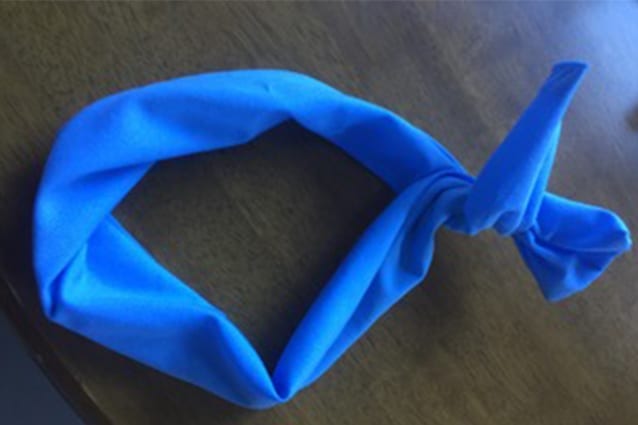
“I am lucky to go to a good school. It is not fair that just because you are a girl, in some countries, you don’t get an education. I wanted to help a girl my own age and show them that we like the same things, even though we are around the other side of the world,” Sasha said.
Insightful and articulate, Sasha reflected upon words of wisdom from her grandmother, which helped inspire her to fight poverty through education.
“My grandmother always says knowledge is power and work makes life sweet. The more we learn, the more we understand each other.” Sasha’s grandmother has always told Sasha to be grateful for the education she is getting and how special it is to help change one girls life.
When Sasha signed up for sponsorship of Alice’s scholarship, she was pleased to learn that their shared favourite animal is a dog, and that Alice aspires to grow up and be a business leader.
Sasha’s mother and grandmother, couldn’t be more proud of Sasha’s efforts in helping provide opportunities for someone else’s daughter, on the other side of the world. It shows the power of kindness.
“I would like this to change one girl’s life and make a difference — everyone can make a difference if you just help a little. Education is the key to making change,” Tamara and her mother believe.
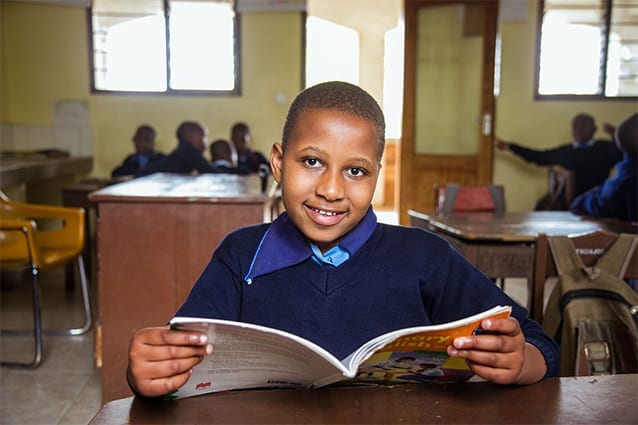
One day, Sasha says she dreams of meeting Alice in person.
“If I got to meet Alice, I would tell her that, ‘I’m so excited that I am helping to give you an education and I hope it helps you.’ I would really like to give her a hug.”
Sasha is a moral and intellectual leader of tomorrow, who is making a difference today. Like her, you can give a helping hand to one of Tanzania’s future leaders. Sponsor or donate during our 2018 Annual Appeal.
Graduate, teacher and future doctor, Dorice is wrapping up her Community Service Year as the sole biology teacher at Sombetini Secondary School.
In 2016, this young leader charmed Australians on tour with Gemma and captured the hearts of her students with her grace and resilience.
We caught up with Dorice to hear about her experience as a teacher.
How are you feeling now that your Community Service Year is coming to an end?
In some ways I feel really good, really excited because I know I am soon going to start another journey in my life. In other ways I feel very sad because of my students. I will really miss them! As you know there is a shortage of teachers and when I leave I don’t know if they are going to have another biology teacher.
What has been the most challenging part of your job?
There is a very big difference, a very huge difference between government school and my education. At St Jude’s we have small classes, few students and enough teachers. We have electricity in classes, computers, and food at every mealtime. Here it is different, the classes have no electricity, and there are too many students – the books are also hard to get.
Most of the students when I came for the first time – they never knew English, so it was very hard. You know biology, it is all in English. Teaching them in English and then translating in Swahili, it was a very difficult thing. The differences now with my students learning in English is huge. Most of them are putting their hands up and speaking so much English.
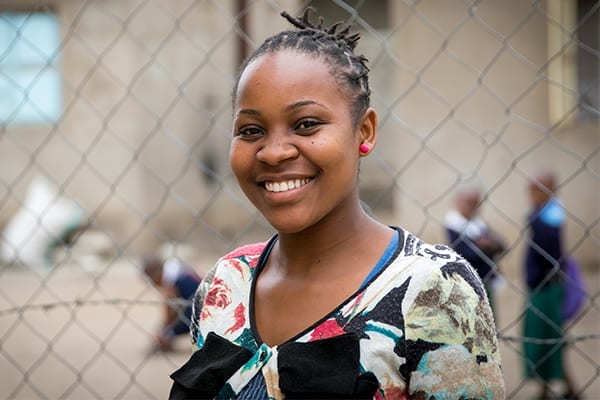
Did you think you could master all this, at the beginning?
For the first time, I was scared. I went home the first day, I told my parents, “I don’t think I can do it”, because it is very hard to be in front of a class of 60 students. My parents they were advising me and giving me hope saying “you can do it”. So I said “OK, I will have to do it and do it will all my heart because I chose it and I want to help these students”. Now I feel so good. I feel so proud of myself!
How do you think this year has changed you as a person?
Actually I feel like I am really grown up now because of dealing with different types of students, different personalities, and other teachers who are much older than me. Now I know I can face different situations and I can make tough decisions. So I feel like I have changed a lot.
I feel I can live and change to any kind of environment. Life in government schools is very hard but I can do it. For example, I can now stay for a long time without eating and still perform my responsibilities, which is a good thing actually.
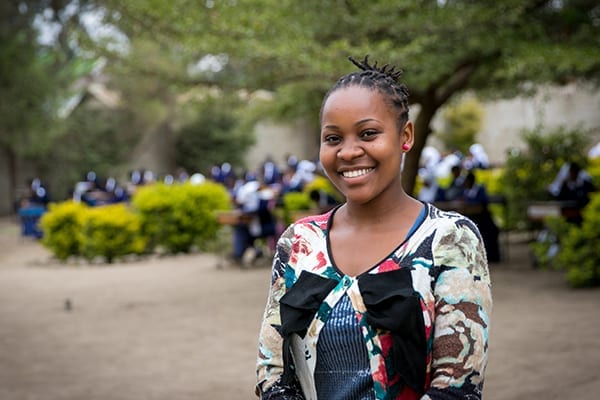
How do your students feel about you leaving for university?
They say how much they will miss me because the way I live with them and treat them is more like a big sister. It’s different with the other teachers. When my students have problems they come and tell me and if I am capable I will always help them. They say when I leave they don’t know how they are going to find some answers in their lives, especially girls, they are more comfortable talking to me.
What is your proudest accomplishment as a teacher?
Now I can see most of my students have a real goal in their life. Last year when I came, I asked my class, “who wants to be doctors?” They were all quiet. “Who wants to be teachers?” They were all quiet. They didn’t understand themselves, what they wanted, or how they could think about their future.
The way I talked to them and advised them over this year I think is why they come to me and tell me, “in university I want to study this” or “in VETA college I want to study this”. So I feel like somehow they have seen what is going on in their lives and how they can have some power in that through education.
As a journalist, it is not often you get to see a tangible example of the effect your work can have.
Sometimes you hope that a particular story will achieve something — expose an injustice or bring about much-needed change, but most of the time, the world goes on as it was.
So getting an invitation to return to Tanzania's School of St Jude — the subject of an Australian Story program I produced in 2005 — turns out to be a once-in-a-lifetime opportunity.
I am here because about 4,000 Australian families signed up to sponsor children at the school after watching the program and I have been invited as a special guest to witness the graduation ceremony of the first batch of students to complete high school.
It is a strange and humbling experience to be welcomed back as if I am the Bob Geldof of the School of St Jude.
"What's it like to see the school you built, Ben?" asks Gemma Sisia, who founded the school after moving from her home on a farm near Armidale, NSW, to Africa at the age of 22.
Since I was last here, the school has grown from housing 500 students to nearly 2,000.
"Those sponsors who signed up after watching Australian Story are the backbone of the school," she says.
"Time and again, I have said that St Jude's would not be the success it is today without the efforts of Australian Story."
Actor Rebel Wilson quietly signed up after seeing the program — several years passed before a young staffer in the St Jude's office recognised the sponsor's name as a star of film and television in Hollywood.
In the days leading up to the graduation ceremony, I keep meeting more and more sponsors who can trace their involvement back to the Australian Story broadcast.
About 70 sponsors have made the trip from Australia to be part of the ceremony, which will be the biggest celebration in the school's history.
I join one of them on a visit to the home of the student she sponsors.
Elizabeth Lekind, 20, lives with her older sister Naomi, Naomi's two young children and their two cows in a small cement house not far from the school.
Elizabeth has pledged to become a doctor, after a dramatic episode while doing volunteer work in a local hospital.
She encountered a woman lying in agony but receiving no attention from the doctors and no medicine.
She raised some money from friends and neighbours and came back the next day with the medicine — but the bed was empty.
"They said she had passed away that night. So I came home crying and that was the day I decided to want to be a doctor," she says.
"I want to help people. From that day, I pursued medicine."
Elizabeth Lekind believes Gemma Sisia has already transformed the future for her.
Without the School of St Jude, she would almost certainly be "married off" by now with several children, because her family could not afford higher education.
"I see her as a mirror to my future. Gemma came with a dream of providing free quality education to poor children, and she dreamt of bringing up the future leaders of Tanzania," she says.
"Many people would say that Gemma is a saviour. A saint."
On a second home visit, I meet eight-year old Emmanuel Kiwale in what can only be described as the slum of Arusha.
His family of five live in a tiny one-room wooden shack with no toilet.
Emmanuel is one of 104 St Jude's students who currently have no sponsor — another 165 are only part-sponsored.
His mother Mariam Omari says she is praying that God will send someone, a sponsor for her son, so that he can continue to study all the way to university and get a good job.
That would improve all of their lives.
As graduation day dawns, Gemma takes to the stage, her voice cracking with emotion.
"It seems like only yesterday that you enrolled. I remember when we were issuing your uniforms," she says, to thunderous applause.
"I remember when you got sick. I remember when you sat your first national exams. You are the reason for this very special day."
As celebrations wind up with the presentation of the giant graduation cake — a cake that turns out to be a decorated, barbecued goat — I feel my faith in humanity being restored.
To be a part of this project where so many people have worked together for a worthwhile goal has been an uplifting experience.
As I say to the students when it is my time to speak, it will be fascinating to watch their progress over the next 20 or 30 years.
What if the future Tanzanian president, groundbreaking scientist or world famous musician is in this room today?
And so now, if my children or future grandchildren ever ask whether I have done anything to make the world a better place, I have a ready answer.
It is my small part in the success of the School of St Jude.
In Tanzania, where a cornfield once lay, now stands a school.
Where kids formerly had no better prospects than minding cows, 2,000 children are getting a great education.